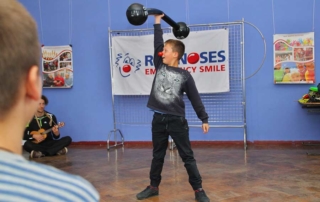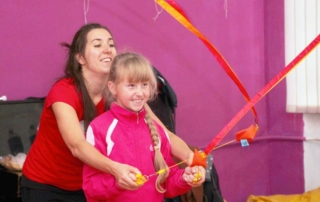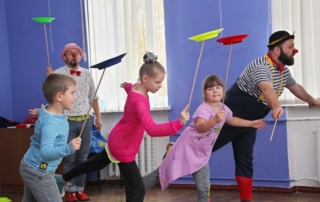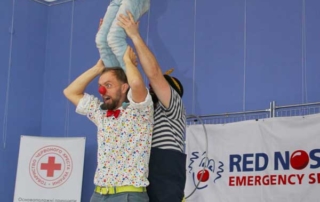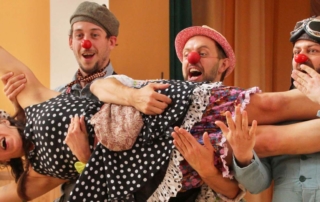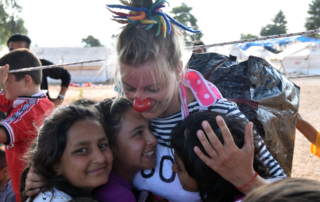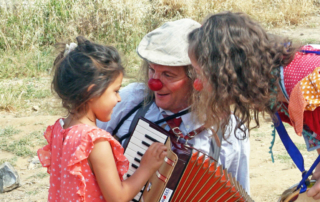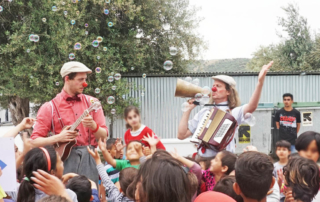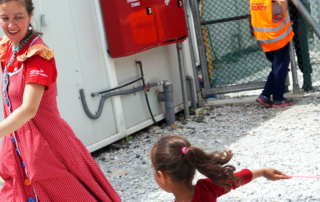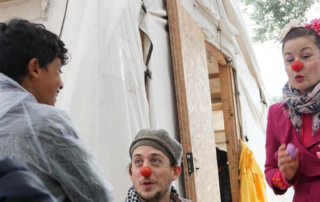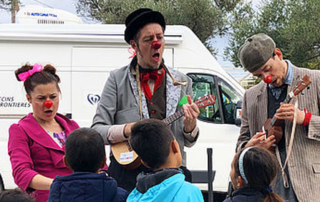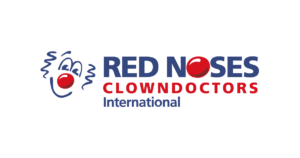
In 2018, Alta Mane supported RED NOSES Clowndoctors International (RNI) also to conduct two Healthcare Clowning Missions, in Ukraine and Lesbos, intended to different displaced and migrant populations and, particularly, to minors on the move. Such support responded, on one hand, to the strategic renewal of Alta Mane tended to back projects creating, on the medium-long term, a systemic and possibly measurable impact, as well as promoting the transfer of skills and competencies to the different stakeholders operating in diverse humanitarian and complex emergency contexts. On the other hand, this support led Alta Mane to identify in the Emergency Smile Mission formats an innovative and integrated approach to address, in a targeted way, the varied needs of a changing society, and to face, in a timely manner, the new migration emergencies in Europe.
“Emergency Smile” is an innovative international Healthcare Clowning program that RNI develops since 2013, in collaboration with strong international partners on the ground, to various countries around the world that either suffer conflicts and natural disasters, or face migration emergencies, to provide psychological support to the diverse transiting populations and, in primis, to children. The missions, adapted to the age and the specific needs of the children, consist of different activities of clowning and Healthcare Clowning that give them the possibility to express their feelings in a playful manner, to help them to reconnect to positive feelings and regain resilience and hope. Furthermore, RNI uses an integrated approach when conducting emergency missions by addressing as well the needs of the humanitarian aid workers (medical staff, social workers, psychologists, etc.) and volunteers that daily work on the frontline by running Humour Workshops to teach them how to use “Humour” as a non-verbal communication tool when interacting with beneficiaries.
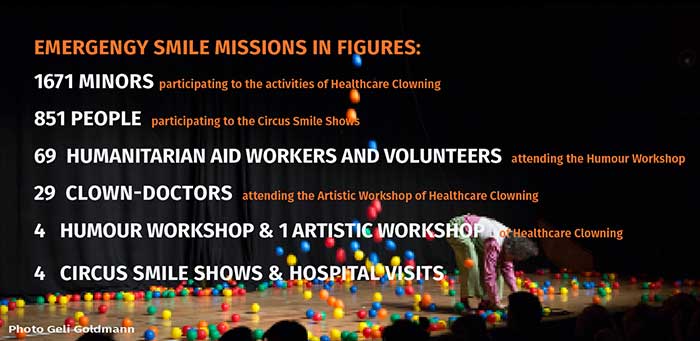
The Emergency Smile Missions are conducted by an international and multidisciplinary team of clown-doctors, trained following a specific RNI curriculum, who receive a regular training “The Special Emergency Smile Training” on the specific needs and different artistic interventions used in emergency and migration settings. Every mission ends up with a Debriefing during which clown-doctors can process and reflect on lived experiences, discuss about critical issues detected during the mission, share the Lessons Learnt and, if necessary, have a psychological consultation. In addition, all the missions undergo an accurate Monitoring & Evaluation Process, specifically designed by RNI, based on a triangulation method of data collection (clown-doctors, Head of Mission and direct beneficiaries) and tended to measure the qualitative impact on beneficiaries (children and humanitarian aid workers) as well as the effectiveness, sustainability and replicability of the Program on the long-term.
Missions supported by AMG
UKRAINE
Since 2014, the Ukraine’s eastern region is characterized by an on-going armed conflict in which the continued hostilities, arbitrary detentions, restrictions in the freedom of expression and the lack of medical and sanitary facilities strongly impact and restrain the life of the population and particularly of the children. The high level of insecurity and the lack of humanitarian corridors obliged thousands of people to flee their homes and take refuge in the different shelter centers destined to IDPs (Internally Displaced Persons) located in the central and western part of the country. To adress this issue, RNI conducted, in collaboration with the Ukrainian Red Cross Society (URCS) a 4 weeks Emergency Smile Mission in different shelter centers and hospital facilities in the Kiev Oblast; in several rehabilitation centers for physical and mental disabled children and one Special Needs School in Bila Tserkva, thus reaching a total of 287 minors and transferring the skills of Healthcare Clowning to 56 humanitarian aid workers and volunteers of the URCS, as well as 29 clown-doctors from 5 Ukrainian Healthcare Clowning organizations.
GREECE
The situation in Moria camp is amongst the worst humanitarian disasters witnessed in migrant and refugee centers on Lesbos (Greece). Everyone suffers from overcrowding and women and girls are routinely molested and even raped. The situation is dire and most people get traumatised and undergo through psycosis and grave mental illnesses. Out of the 9’000 people located there, 3’000 of them are children.
To adress this humanitarian crisis in a timely manner, RNI conducted, in collaboration with Médecins sans Frontières Greece (MSF) and the NGO RefugeeforRefugees, a two weeks urgent mission on Lesbos in Moria Camp (Olive Grove area in the medical facility of MSF); Kara Tepe Camp (in collaboration with Refugee4Refugees) and the Gekko Kids School (Mytilene), a school exclusively intended to unaccompanied minor refugees, thus reaching a total of 1’330 minors, and transferring the skills of the Healthcare Clowning to 13 humanitarian aid workers and volunteers of Refugee4Refugees who attended the Humour Workshop.
Photos ©Borut Zivulovic
From 2013 up today, RNI conducted 23 missions in 7 countries
(Belarus, Cameroun, Jordan, Greece, Kyrgyzstan, Sierra Leone and Ukraine),
reaching 12’550 beneficiaries.
Objectives reached by the Emergency Smile Missions
The work you do is just as important for the target group as the work we do on the ground. Just one performance has a huge impact on refugees and migrants. It changes something, intangible but still real.
The work the RED NOSES Clowns do here is so important. These children desperately need positive images in their life in order to become psychologically healthy and be able to contribute in a good way wherever they end up
[The RED NOSES Clowns’] assistance is an invaluable contribution to the development of psychosocial activities by the Ukrainian Red Cross Society and certainly a tangible support in the dissemination of information about methods and forms of psychosocial support. Thanks to the received good expertise, the URCS will be able to achieve great results in improving the welfare of the beneficiaries affected by the crisis”.

